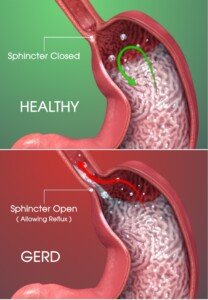
If acid reflux is going on in your body, would you necessarily have any symptoms or can this problem go on without causing even the slightest heartburn, burping or other little disturbance?
Though you’ve probably heard of the term “silent reflux,” this is not what I’m talking about.
In fact, silent reflux is actually infamous for a myriad of symptoms such as a chronic cough, a sensation of difficulty breathing and awakening with a scratchy irritated throat.
Acid reflux, as you may already know, is when the acidic contents of the stomach make their way upward into your esophagus.
These “gastric juices” are best confined to the stomach, but there are well-known triggers of their esophageal entry such as anxiety and stress; reactions to food; and lying down for extended periods of time.
Even exercise can trigger acid reflux. Rapid eating (regardless of food type) can also set off a little regurgitation.
Usually, when the juices get into the esophagus, the result is heartburn or chest discomfort, or sometimes a burning sensation in the upper abdomen.

Scientific Animations, CC/BY-SA/Attribution-ShareAlike 4.0 International
The acid can get as far as throat level, causing “silent reflux,” also known as LPR: laryngopharyngeal reflux disease.
Sometimes, however, acid reflux, indeed, does not produce any symptoms.
“So – nearly everyone has some acid reflux each day,” says Dr. Brian Lacy, MD, of Dartmouth Hitchcock Med Center, who specializes in functional disorders of the gastrointestinal tract and is author of the book “Healing Heartburn.”
Dr. Lacy continues, “In fact, most people have approximately 1.5 hours per day when gastric acid (and other contents) refluxes up into the esophagus.
“In some people this causes classic symptoms of reflux (heartburn and regurgitation); in others it doesn’t cause any symptoms at all. And, in a very small percentage of patients, it may cause chest pain.”
If you feel perfectly fine as you’re reading this, you just might be experiencing some acid reflux.
This is nothing to be concerned about. But if you begin feeling chest symptoms (that are caused by reflux) and it goes untreated, this can put you at risk – over time – to a condition called Barrett’s esophagus, which is a risk factor for esophageal cancer.
 Dr. Lacy combines his love of science, medicine and people to uncover the causes of symptoms like stomach pain, gas, bloating, diarrhea, constipation and regurgitation.
Dr. Lacy combines his love of science, medicine and people to uncover the causes of symptoms like stomach pain, gas, bloating, diarrhea, constipation and regurgitation.
 Lorra Garrick has been covering medical, fitness and cybersecurity topics for many years, having written thousands of articles for print magazines and websites, including as a ghostwriter. She’s also a former ACE-certified personal trainer.
Lorra Garrick has been covering medical, fitness and cybersecurity topics for many years, having written thousands of articles for print magazines and websites, including as a ghostwriter. She’s also a former ACE-certified personal trainer.
.









































